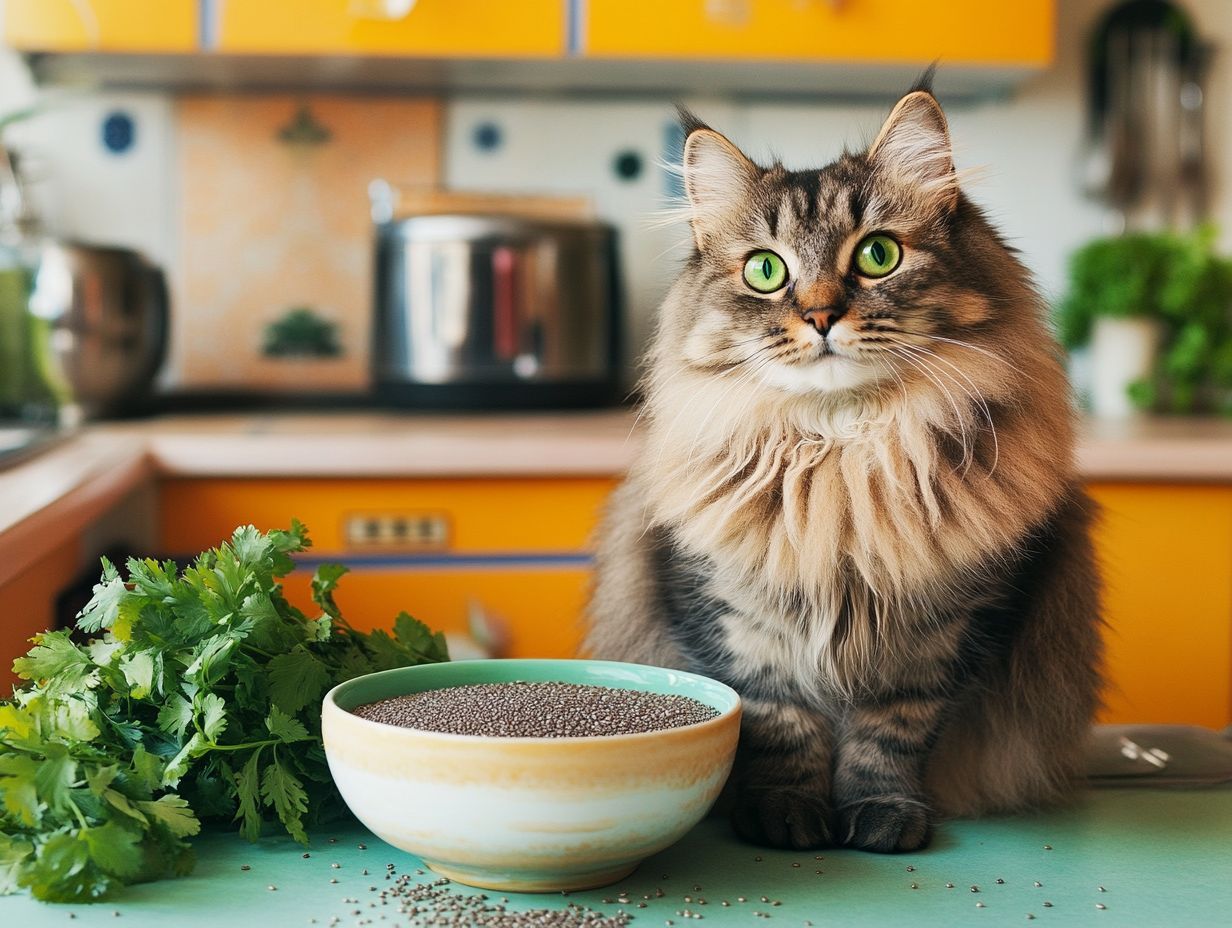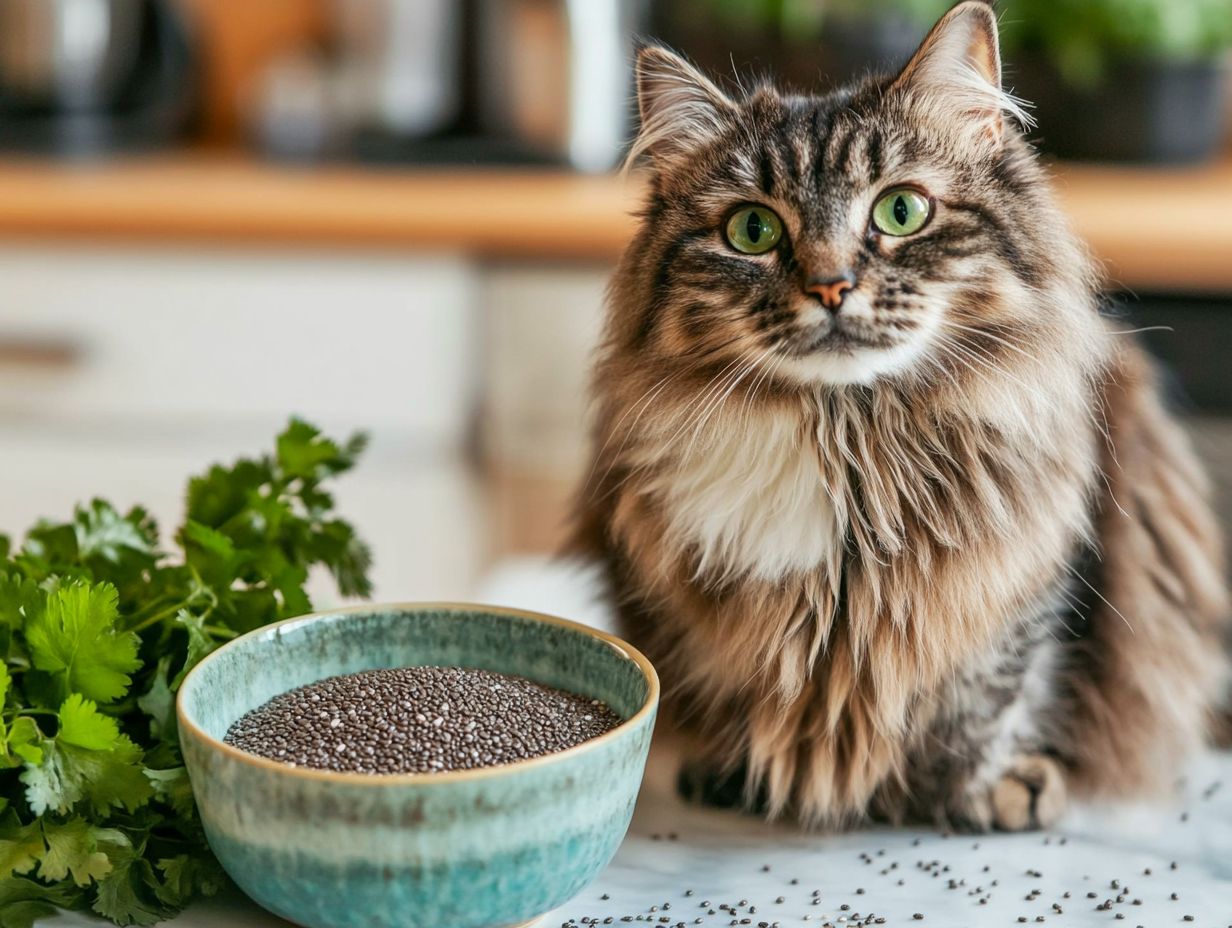Curious about whether your feline friend can enjoy chia seeds? These tiny superfoods are a nutritional powerhouse packed with essential nutrients, but are they safe for cats? It’s crucial to consult a veterinarian before introducing any new food, including chia seeds, to your cat’s diet.
This article explores the nutritional value of chia seeds, highlighting their key benefits for cat nutrition and potential risks. Read on to find out if chia seeds for cats are a worthy addition to your cat’s meals!
Key Takeaways:

- Chia seeds can be a nutritious addition to a cat’s diet, providing essential nutrients such as protein, omega-3 fatty acids, and fiber.
- However, it is important to be cautious when feeding chia seeds to cats, as they can potentially cause digestive issues, gastrointestinal upset, or allergic reactions.
- If you choose to incorporate chia seeds into your cat’s diet, start with 1/4 teaspoon mixed into their food and monitor for any adverse effects. Consider other nutrient-rich options like flaxseeds, fish oil, or fiber supplements as alternatives.
Can Cats Eat Chia Seeds?
Chia seeds come from the Salvia hispanica plant, which belongs to the mint family. Many cat owners include chia seeds in their pets’ diets due to their numerous nutritional benefits, such as high fiber content, omega-3 fatty acids, and various micronutrients.
Chia seeds can offer nutritional benefits, but their safety depends on your cat’s unique digestive system and needs. If considering chia seeds as a supplement, it is advisable to consult a veterinarian for guidance on how they fit into an overall cat food regimen.
Despite their small size, chia seeds are a nutritional powerhouse packed with nutrients beneficial to cats. They are rich in antioxidants, which help protect the body from stress and damage caused by free radicals. Additionally, chia seeds provide essential omega-3 fatty acids that support skin and coat health, as well as strengthen the immune system. The seeds also contain calcium and magnesium, minerals that contribute to bone formation and growth, and their high fiber content can help alleviate constipation.
However, flaxseed oil or fish oil may be preferable, as they offer a better omega-3 to omega-6 ratio than chia seeds. Chia seeds can be safely fed to cats in moderation. The most common side effect of overfeeding chia seeds is gastrointestinal upset or blockage due to their high fiber content. Common signs of allergic reactions or digestive issues may include vomiting, diarrhea, or lack of appetite.
Therefore, cat owners should introduce chia seeds gradually and monitor for any adverse effects. A veterinarian can provide guidance on the appropriate serving size for individual cats. When incorporated into a balanced dietary strategy, chia seeds can be a beneficial addition to a cat’s nutrition, promoting feline health.
Nutritional Value of Chia Seeds for Cats
Chia seeds are frequently regarded as one of the most nutritious foods available. They are rich in various nutrients that can benefit a cat’s diet, particularly due to their omega-3 fatty acids and high fiber content, which supports digestive health.
Additionally, chia seeds may help address digestive issues and promote overall feline health. For more information, you can check this Nutritional Guide on Whether Cats Can Eat Chia Seeds.
Key Nutrients and Benefits
Chia seeds are packed with key nutrients, including omega-3 fatty acids and dietary fiber, which offer numerous health benefits that can enhance a cat’s overall well-being, particularly in supporting digestive health and improving nutrient absorption and vitamin intake.
These tiny seeds are also rich in protein, antioxidants, and essential minerals such as calcium and phosphorus, all of which contribute to strong bones and overall vitality.
Incorporating chia seeds into a cat’s diet can promote optimal gut health by helping to prevent gastrointestinal upset, a common issue among felines. The high fiber content regulates bowel movements, making it easier for cats to digest their food and maximize nutrition from their meals.
Additionally, omega-3 fatty acids support cardiovascular health and reduce inflammation, further strengthening a cat’s immune system and enhancing their quality of life.
Potential Risks of Feeding Chia Seeds to Cats
While chia seeds have many benefits, it is essential to be aware of the potential risks involved. Overfeeding can lead to digestive upset or blockage. Specific digestive issues that could arise include bloating, gas, and constipation. Always consult your veterinarian before making any changes to your cat’s diet.
Conclusion
In conclusion, chia seeds can be a nutritious addition to a cat’s diet when introduced cautiously and in moderation. Always consult with your veterinarian to ensure they fit within your cat’s dietary needs.

What Are Chia Seeds?
Chia seeds are tiny seeds derived from the Salvia hispanica plant, known for their nutritional benefits. They are often used in human diets due to their high fiber, protein, and omega-3 fatty acids content. However, it’s important to consider how these seeds affect our feline friends.
Benefits and Risks of Chia Seeds for Cats
Chia seeds offer some health benefits for cats, but there are also potential risks associated with their consumption. These risks include stomach problems and digestive issues, which may arise from overconsumption or improper introduction into a cat’s diet. Therefore, it is crucial for cat owners to consult with a veterinarian before incorporating chia seeds as a daily staple in their pets’ diets.
Possible Adverse Effects
The potential adverse effects of chia seeds for cats include:
- Stomach problems like bloating and gas
- Digestive upset, particularly if given in large amounts due to their high fiber content
- Obstructive conditions in the intestines, especially in smaller cats or those with pre-existing digestive issues
After introducing chia seeds, cat owners should closely monitor their pets for signs of diarrhea, lethargy, or any adverse reactions. However, modest amounts can provide health benefits, such as omega-3 fatty acids, without the associated risks of excessive intake. Remember, chia seeds should not replace primary sources of nutrition like high-quality cat food in a cat’s diet.
Before adding any new food to a pet’s diet, it is always advisable to consult a veterinarian to ensure safe feeding practices. This approach gives cat owners peace of mind and helps protect their pets from potential harm.
How to Incorporate Chia Seeds into a Cat’s Diet
The safe and appropriate serving size of chia seeds for cats depends on several factors, including the individual cat’s nutritional needs and the risk of digestive upset if consumed in excess.
Safe and Appropriate Serving Sizes
The serving size of chia seeds for cats should be safe and appropriate. It is recommended to start with small amounts:
- Teaspoon of chia seeds soaked in water to help the cat acclimate
- For larger cats, a maximum of up to a tablespoon may be tolerated
- Smaller breeds should stick to the initial teaspoon serving size
Chia seeds should be introduced gradually, just like any other new food. After introducing chia seeds, closely monitor the pet’s health for any changes in digestion or signs of allergic reactions. Consumption should always be kept in moderation, and pet owners are encouraged to consult a veterinarian for specific dietary advice if needed.
Alternatives to Chia Seeds for Cats

For cat parents who prefer not to give chia seeds to their cats or wish to explore other healthy options, there are various cat food alternatives and fiber supplements available to meet their feline companions’ dietary requirements.
Other Nutritious Options
Nutritious alternatives to chia seeds for cat food include:
- High-quality animal protein sources like cooked chicken, turkey, and fish (e.g., salmon)
- Cat grass, which provides dietary fiber and aids in digestion
- Plant-based options such as pumpkin and sweet potatoes that supply important nutrients
Incorporating these alternatives can ensure that all essential amino acids and dietary needs are met, promoting overall well-being and vitality while keeping your beloved pet happy and addressing any health conditions.
Frequently Asked Questions
Can cats safely eat chia seeds?
Yes, cats can eat chia seeds in small amounts and as part of a balanced diet. However, it is important to introduce them gradually to avoid digestive issues.
What is the nutritional value of chia seeds for cats?

Chia seeds are a good source of fiber, protein, and omega-3 fatty acids for cats. They also contain essential vitamins and minerals like calcium, magnesium, and phosphorus.
Recognizing Negative Reactions
Cat owners should be aware of potential negative reactions after introducing chia seeds, including:
- Diarrhea
- Excessive lethargy
- Vomiting
If any of these symptoms appear, discontinue feeding chia seeds immediately and consult a veterinarian.
Conclusion
In summary, while chia seeds can offer benefits for cats, they should be introduced carefully and in moderation. Always consult with your veterinarian before making changes to your cat’s diet to ensure their health and happiness.
Introducing Chia Seeds to Your Cat’s Diet
Chia seeds are gaining popularity as a nutritious addition to pet diets. Packed with omega-3 fatty acids and fiber, they offer several health benefits for cats. However, it’s essential to introduce them safely to avoid any adverse effects. Start by mixing 1/4 teaspoon of chia seeds into your cat’s food initially and gradually increase the amount over a few weeks. This approach allows your cat’s digestive system to adjust to the new addition.
Are There Any Potential Risks of Feeding Chia Seeds to Cats?
While chia seeds are generally safe for cats, there are a few potential risks to consider:
- Choking Hazard: Chia seeds can pose a choking hazard if not properly soaked or ground.
- Gastrointestinal Upset: Overfeeding chia seeds may cause stomach upset, so moderation is key.
Can Chia Seeds Benefit My Cat’s Health?
Yes, chia seeds can provide several health benefits for cats, including:
- Improves Digestion: The high fiber content aids in regular bowel movements.
- Enhances Coat and Skin Health: Omega-3 fatty acids promote a healthy, shiny coat.
- Supports Joint and Heart Health: Nutrients in chia seeds contribute to overall wellbeing.
However, they should not be used as a replacement for a balanced diet formulated for cats. Always ensure that chia seeds are integrated safely as part of your cat’s nutrition alongside traditional cat food.
How Much Chia Seeds Should I Give My Cat?
The recommended amount of chia seeds for cats is no more than 1 teaspoon per day for every 10 pounds of body weight. For instance, for a 10-pound cat, start with 1/4 teaspoon and gradually increase to 1 teaspoon if well-tolerated. Consult with your veterinarian for specific recommendations based on your cat’s individual needs and health conditions.
Note: Always consult your veterinarian before introducing new foods to your cat’s diet to ensure safety and nutritional adequacy.
Conclusion
In summary, chia seeds can be a nutritious addition to your cat’s diet, but moderation is crucial. Keep your veterinarian involved in dietary changes to maintain a balanced diet for your feline friend.